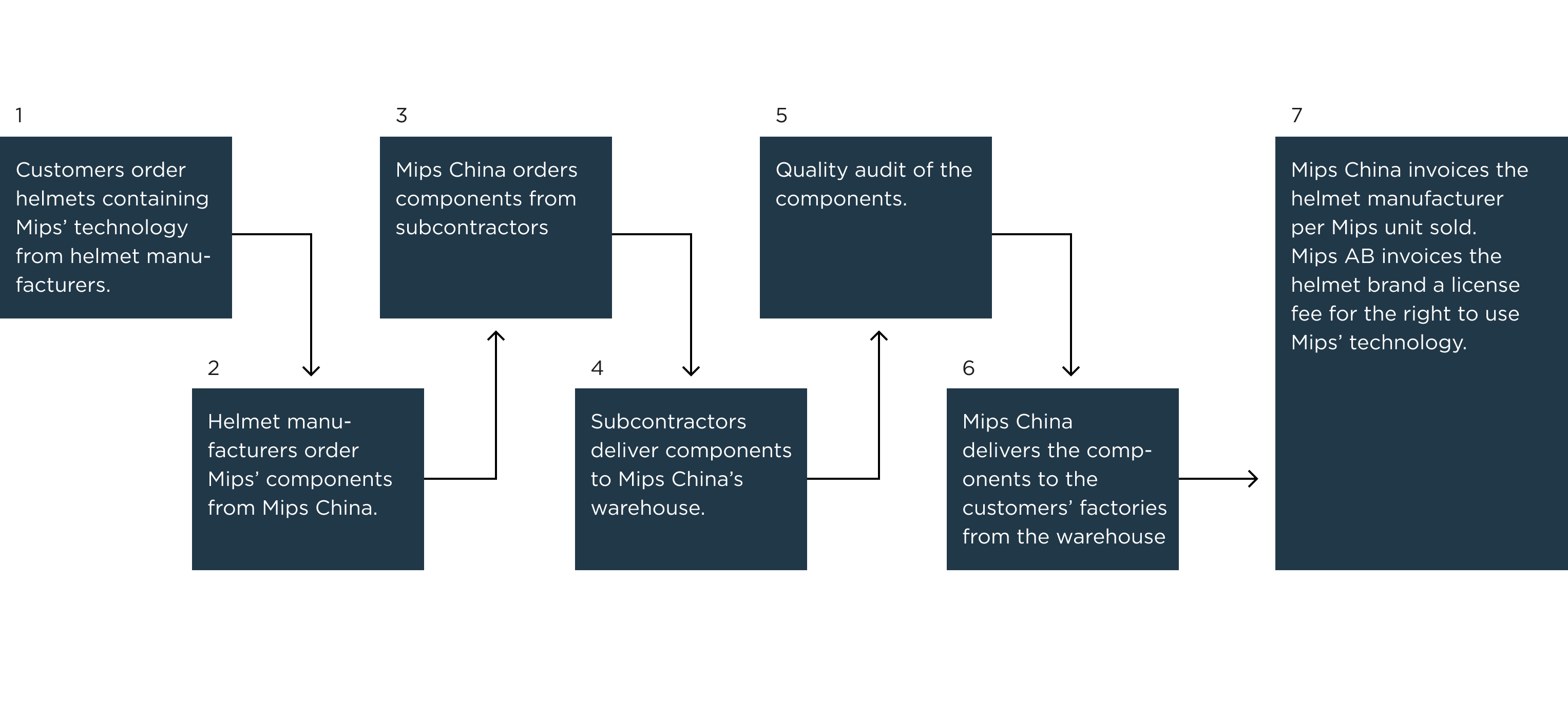Share price
246.4 SEK
Mips AB (Mips) -1.39 SEK (-0.56%)
Last updated 25 February 2026, 10:39 CET
Work continued to implement the ten principles of the UN Global Compact and the UN’s Sustainable Development Goals within Mips' operations.
Continued to develop product lifecycle analysis by adding in Mips Integra Fuse, Mips Integra Split, different material options for Mips Integra TX, and color options for the plastic in Mips’ products.
Mips achieved its goal of a 40–60 distribution of women and men in the workplace, the figure for 2023 was 46/54 percent women/men.
Reduced emissions per solution by an average around 20.8%.
Carried out third-party audits of the three strategically most important suppliers in the supply chain.
By year-end, offer Mips’ suppliers post industrial recycled plastic for all manufacturing of Mips’ most sold solution.
Daring means being brave, innovative, and challenging the status quo. We are curious about trying new solutions and are not afraid to make mistakes or ask for help. We challenge ourself and others to achieve Mips’ vision.
Caring involves creating a sustainable environment where people can perform. We show our colleagues respect. In our desire to achieve the highest quality, we take responsibility for our own wellbeing.
Sharing is about creating transparency, a sense of belonging, and trust. We continuously share our experiences and knowledge with our colleagues. We support collaboration across functional areas.
In 2023, Mips has continued the ambitious journey towards a more sustainable future with a clear goal, governance model, and motivated organization.
Science based targets
Reduced emissions per solution sold by an average of around 21% vs. 2022
UN Global Compact
Carried out third-party audits of the three strategically most important suppliers in the supply chain
Circular product offering
Offered Mips’ suppliers 100% post industrial recycled plastic for Mips’ most sold solution
In 2021 Mips carried out the first analysis of its total climate impact according to the Greenhouse Gas (GHG) Protocol. In 2022 and 2023, Mips has had access to more granular data and has been able to refine the analysis of total emissions. This has enabled an update of the calculations used in 2021 with more exact data. Previous year Mips set a goal to reduce its total emissions by 42 percent by the end of 2030 based on SBTi’s calculations, not including growth. For 2023, the target was to reduce total emissions by 12 percent per unit sold, and the outcome was an average decrease per sold unit with 20.8 percent.
Total emissions 2023
| • | Production | |
|---|---|---|
| Raw material | 39.9% | |
| Electricity suppliers | 38.8% | |
| Transport | 4.7% | |
| Totalt | 83.4% |
| • | Other | |
|---|---|---|
| Other | 9.6% | |
| Travel | 4.3% | |
| Refrigerants | 1.9% | |
| Electricity China | 0.6% | |
| Water | 0.0% | |
| Electricity Sweden | 0.0% | |
| Totalt | 16.6% |
Mips constantly strives to limit its impact on the climate and the environment, which is continually assessed along with the sustainability of the supply chain and the products and their actual impact on the world. Mips continued the mapping of the total climate impact of its operations during the year.

Part of Mips’ vision is to use Mips’ technology so that helmets in all categories protect users better than current test standards promote.
Mips is a pioneer in this important field, so it is vital that the company can attract and retain employees with the right skills and passion to always make safer and better solutions. Even though Mips is the world leader in its field, Mips’ people are modest and curious, with a desire to learn more. Mips’ employees constantly challenges themselves and the company encourages all employees to bring the best of themselves to work every day.
Sustainable societal development is extremely important for us, we believe that our technology and products lead to a more sustainable society since they are designed to improve helmet protection for both recreational and professional use. Improved helmet protection leads to increased safety and security while reducing risk for both short-term and long-term sick leave, as well as permanent injury.

Mips does not conduct any of its own production, and instead uses external suppliers for product manufacturing. To ensure that the supply chain and the manufacturing of the solutions is sustainable, Mips needs to ensure that the supply chains of its suppliers are sustainable and comply with requirements stipulated by laws and conventions.
